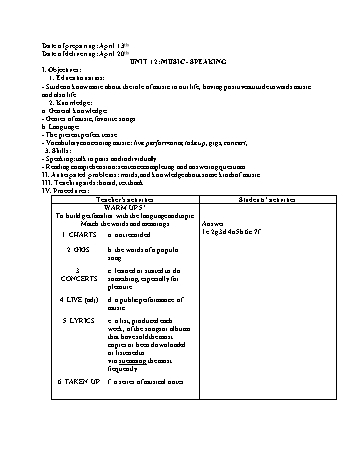Giáo án Tiếng Anh Lớp 10 cơ bản - Unit 12: Music (Speaking)
UNIT 12: MUSIC - SPEAKING
I. Objectives:
1. Education aims:
- Students know more about the role of music in our life, having positive attitude towards music and also life.
2. Knowledge:
a. General knowledge:
- Genres of music, favorite songs
b. Language:
- The present perfect tense
- Vocabulary concerning music: live performance, take up, gigs, concert,
3. Skills:
- Speaking: talk in pairs and individually
- Reading comprehension: sentence completing and answering questions
II. Anticipated problems: words, and knowledge about some kinds of music
Bạn đang xem tài liệu "Giáo án Tiếng Anh Lớp 10 cơ bản - Unit 12: Music (Speaking)", để tải tài liệu gốc về máy hãy click vào nút Download ở trên.
Tóm tắt nội dung tài liệu: Giáo án Tiếng Anh Lớp 10 cơ bản - Unit 12: Music (Speaking)

Date of preparing: April 13th Date of delivering: April 20th UNIT 12: MUSIC - SPEAKING I. Objectives: 1. Education aims: - Students know more about the role of music in our life, having positive attitude towards music and also life. 2. Knowledge: a. General knowledge: - Genres of music, favorite songs b. Language: - The present perfect tense - Vocabulary concerning music: live performance, take up, gigs, concert, 3. Skills: - Speaking: talk in pairs and individually - Reading comprehension: sentence completing and answering questions II. Anticipated problems: words, and knowledge about some kinds of music III. Teaching aids: board, textbook IV. Procedures: Teacher’s activities Students’ activities WARM UP 5’ To build get familiar with the language and topic Match the words and meanings 1. CHARTS a. not recorded 2. GIGS b. the words of a popular song 3. CONCERTS c. learned or started to do something, especially for pleasure 4. LIVE (adj) d. a ... every other day every Tuesday every single day several times a year twice a year Tips: Using phrases, rather than just single words, to express frequency will impress the examiner. Instead of I occasionally play tennis, say I play tennis every now and again. Instead of I often take photos, try using this present continuous structure instead: I'm always taking photos. Activity 3: Ask ss to work in pair Ask and answer 1. Do you often listen to music? 2. What kinds of music do you like? 3. When do you listen to music? 4. Where do you usually listen to music? 5. Do you like to listen to live music? 6. Do you know how to play a musical instrument? 7. Do you like singing? 8. Would you like to become a widely-known celebrity? Why? Answers: a [+] be keen on + -ing or noun b (-) can 't stand + -ing or noun c [+] be crazy about + -ing or noun d [indifferent] not mind + -ing or noun e [+] be fanatical about + -ing or noun f [indifferent] can take it or leave it g (-) is not my kind of thing Use one of the above expressions to make a sentence every single day [using single adds extra emphasis] every other day (one day yes, one day no, one day yes, one day no) every Tuesday once a fortnight several times a year twice a year Ss’s answer Note the tips to ask So to repeat the questions Only one sounds polite enough. Why do the other candidates sound impolite? Think about word choice and intonation. a Repeat, please. (This is too abrupt and is not something English people generally say. It appears rude despite the please.) b Could you say that again, please? (This is suitable. It uses a modal verb and the intonation is polite.) c What? (Although the intonation here is polite, asking somebody in a formal situation to repeat by saying What ? is impolite.) d What did you say? (This is impolite.) POST-SPEAKING 10’ Call some ss to talk about their favorite types of music Present individually
File đính kèm:
 giao_an_tieng_anh_lop_10_co_ban_unit_12_music_speaking.docx
giao_an_tieng_anh_lop_10_co_ban_unit_12_music_speaking.docx

